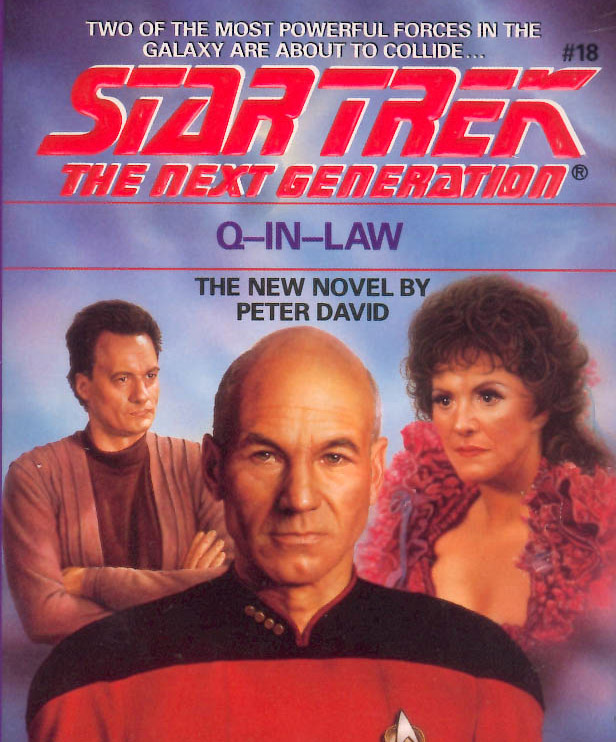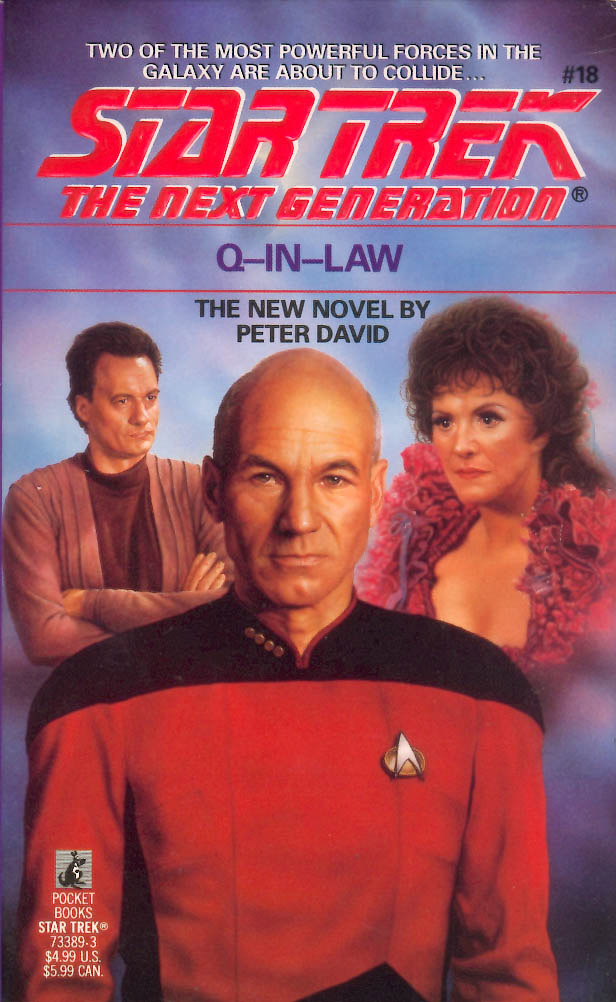Trek Culture Book Review: Q-IN-LAW

The thing I love most about Star Trek is the stories it inspires in my mind. Each episode is the doorway into new story possibilities in the Star Trek universe, so I am exploring the stories that Star Trek has inspired in other people’s minds looking for deeper explorations of themes and characters.
I chose Q-In-Law as my 2nd “mission" because it featured two of my favorite comedic characters, Lwaxana Troi and Q. The hilarity that my mind conjured for such an encounter convinced me that this book had to be the TNG book that I read first.
This is my third attempt to write about Q-In-Law. I have come through a serious attempt to talk about the literary merits of Q-In-Law, an angry rant about teenagers, and a serious questioning of my love of Star Trek (don’t worry, I’m ok now) to arrive at this:
Q-In-Law, when read in the right frame of mind, is the (unintentional) Redshirts of 1991.
Where Redshirts cleverly utilizes science-fiction tropes and the fourth wall to point out how absurd the universe would be if Star Trek were played through using its own rules, Q-In-Law uses half-baked literary allusions, anachronistic dialog, cliches, and other literary torture devises to be a commentary on fan fiction’s tendency to take awesome story concepts, squish in terrible story concepts, get certain characters spot-on while completely ignoring previous characterizations of others, and Star Trek’s sometimes strange handling (or failure to handle) certain issues.
Taking them one at a time…
Awesome story concept
What if Q popped in on Enterprise at the same time as Lwaxana Troi was there and “in-phase"?
What if someone gave Wesley a present of a girl who wants desperately to have sex with him and he’s diplomatically manipulated to think that if he refuses he’ll start a war?
Terrible Story Concept (and half-baked literary allusion)
What if we did Romeo & Juliet in space, but subverted the ending by giving Lwaxana Q’s powers, leading to the following framing plot:
There’s a wedding that has to be hosted on Enterprise because the bride and groom are the children of rival merchant families. —> shenanigans —> they break up —> violent(ish) shenanigans —> true love and everyone learns their lesson (except Q).
Characterization
It was clear that this was written for the comedy of the situation and Lwaxana and Q certainly are funny. Q throws one-liners out easier than he snaps his fingers and transports the Enterprise out of the universe, the best one easily being, “You’ll have to forgive Worf. He just discovered opposable thumbs and he’s feeling overly confident." (location 884)
On the other hand Picard in particular was nothing more than the name that was slapped on the actions of the captain. There was nothing Picard-like about him. For example, at one point “Picard tried to force an amiable smile that wound up looking more like a desperate grin." (location 883, I read this in ebook form) I have never seen Picard with a desperate grin nor have I seen him fail to put up a diplomaticly appropriate facial expression when necessary. I doubt even Q could goad Picard into a desperate grin.
There are many more (in equal amounts) examples of Q and Lwaxana being funny and other characters being off their game.
Awkward Handling of Issues
What does one do with a gift that is a person? If you’re Wesley you freak out a bit, resist the overtures of the clearly-indoctrinated girl, and try to figure out what to do with her that won’t start a war. In the end though, the girl goes back to her original owner and it turns out that Wesley mostly wanted to get rid of her because she was clumsy. At the wedding reception Wesley stands around with the father-of-the-bride discussing how women just tell men what they want to hear and the conversation ends with
"Women, eh?"
"Women," agreed Wes.
Speaking of women…what does one do with one’s mother who has the hormones of a teenager and is acting like it? If you’re Deanna Troi and your mother is Lwaxana you stomp around and yell at her a lot until she listens (and we all know how well teenagers listen).
Should you read this book?
Perhaps, if you’re find a copy of the audiobook, it may be worth listening to Majel Barrett and John de Lancie read their parts in-character, but I otherwise can’t in good conscience recommend it despite reassurances that Peter David has written good Star Trek books. Go track those down. Jerad Formby (of Hey Star Trek! fame) recommends Vendetta because "[Peter David] actually evolved [the Borg] in a way that made sense instead of just taking their teeth out as the showrunners did."


